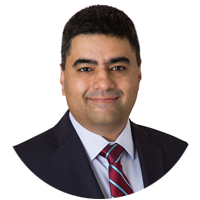Umar Latif, MD | Effective Writing for Health Care

When he signed up for Harvard Medical School’s Effective Writing for Health Care program in 2022, Umar Latif, MD, had already accomplished a great deal in his career. A triple board-certified fellow of the American Psychiatric Association and a George W. Bush Institute Scholar, he serves as the co-founder and national medical director for Help for Heroes, which assists active-duty service members, veterans, and first responders with mental health and substance abuse disorders. During the COVID-19 pandemic, he took on the additional work of writing a speculative fiction novel as a creative outlet for self-care.
The exercise helped him realize that, even with all his accomplishments, he still had gaps in his technical knowledge. “It’s a humbling experience to find that writing isn’t easy,” he remembers. “You go through significant training in medical school, but the craft of writing well is a learned skill set that doesn’t come easily to all of us.”
A colleague who had participated in the previous year’s Effective Writing for Health Care cohort encouraged him to apply to the program. What followed was a transformative experience, both for Latif’s expertise and his career as a whole.
Learning to Write Passionately About a New Research Area
Latif chose the specialized Writing for the Public track in part because of his newfound interest in communicating ideas more effectively and in part because his work as a psychiatrist had already given him preliminary skills as a storyteller.
“It’s a very sacred thing, being a trusted physician to someone who is sharing a very vulnerable place in their life,” he says. “You become a holder of that story without any judgment, but then you have to help them see a different side of that story so hope can emerge.”
During the COVID-19 pandemic, Latif had become fascinated by physician burnout—his own and as a broader topic: its adjacency to the construct of moral injury, or the harm that comes from violating one’s core values. Noting the hundreds of physician suicides a year as symptomatic of larger systemic issues, he was particularly compelled by the underlying challenge of moral injury in our current health care system.
“Here’s something I’ve been observing and hearing from colleagues for the last couple of years: how do I communicate it to the public and stakeholders?” he recalls thinking.
In his cohort, Latif was impressed by the diversity, not just in the content and the speakers but also in his classmates. “Some of them were submitting manuscripts, some were writing for the public, and some were writing grants. There was so much learning from each other—that was really exciting,” he remembers. The cohort was able to meet in person for modules two and three, which empowered the group to embrace their new identities as writers.
“This collective sense emerged in the course that what I have to say actually does have value and impact. There was this internal imposter syndrome initially: What could I add to the conversation that has not already been said so many times by so many people much more skilled than me? But the course was really a powerful lesson that we, too, as a group, could get our written words out into the world.”
Latif was voted to be class speaker. In his speech to the graduating class in 2023, he talked about the importance of the craft of writing—the dedication and effort of putting ideas on the page. “Good writing and good thinking are inseparable,” he said, adding that the craft demands “rigor and discipline. Inspiration doesn’t get words on the paper, neither does waiting for the muse, no matter how long you brew your loose leaf tea.”
Taking New Writing Skills into the Field and Beyond
In keeping with his research interests, Latif entitled his capstone project, “Who Heals the Healers? Is Moral Injury the Missing Link in Fixing Physician Burnout?” Existing research usually focuses on challenges that individual practitioners face, and solutions are directed toward how to help the person instead of the system as a whole. Latif was interested in exploring the tension between physicians’ focus on saving lives and corporate medicine’s inexorable quest for profit.
As a result, he explains, “There’s a gradual erosion of what your values are. Every day you’re trying to fight upstream against your core values that are no longer in alignment with what you signed up for in medical school.”
Latif felt impassioned to write to “his tribe,” that is the physician body as a whole. He hoped to help them develop the language to recognize that they were experiencing something beyond burnout.
“You do have agency—you do have a voice,” he explains. “But how do you articulate moral injury without being labeled as a burned-out doctor? How can you realign stakeholders in our health care system to reconnect with the higher calling of ‘first do no harm’?”
This is a feature of Latif’s ongoing work. He was asked to join the Texas Medical Association’s first inaugural Leadership Program in 2023, and an article on this topic, “Frontline Defender,” was published that August. Much of the article drew from his capstone project; in his current role on the association’s ad hoc committee for their wellness program, Latif is hoping to do more writing on the subject.
He credits the Effective Writing for Health Care program for empowering him to proceed in this new direction and for giving him the tools to move from idea to execution. “If I’m going to be able to make an impact at a larger scale, I have to be able to win over audiences in an effective way,” he says. “Who heals the healers, if not us?”